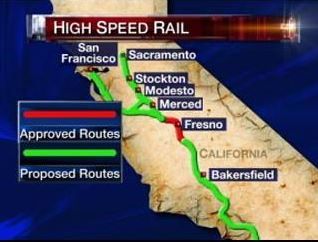New appeal seeks to halt bullet train
by James Poulos | September 18, 2014 11:00 am
 A new legal move has ratcheted up the legal battle around California’s $68 billion high-speed rail project.
A new legal move has ratcheted up the legal battle around California’s $68 billion high-speed rail project.
In a controversial decision late this July, the California Court of Appeal for the Third District brushed aside[1] claims that ballot wording and voters’ intent carried legal weight that legislators’ plans did not. Now the Pacific Legal Foundation has joined the original Kings County plaintiffs in appealing that verdict, hoping to be heard by the California Supreme Court.
In the case summary posted on its website, PLF lawyers described[2] two lines of argument they’ll make before the court, if the appeal is accepted. First, PLF alleged, state officials “attempted to evade meaningful oversight” of the high-speed rail project. The evidence before past courts, PLF claimed, has been “insufficient” to justify “even the most lenient judicial review of the High Speed Rail Finance Committee’s decision to authorize issuance of the bonds.”
Billions on the line
Those bonds are at the heart of the fight over the bullet train’s future. The plaintiffs arrayed against their authorization have maintained that at least $8.6 billion of bonds cannot be sold unless the terms set out in Prop. 1A have been fulfilled. Stu Flashman, the attorney representing plaintiffs from Kings County, said[3] the ballot measure’s language was “clearly intended to protect the state from the financial risk” the train might create. According to plaintiffs, courts must recognize that voters approved Prop. 1A in accordance with the plain reading of its text, not because they supported the more vague or general goal of high-speed rail.
Previously, Sacramento County Superior Court Judge Michael Kenny had agreed, ruling against[4] the bullet train in three ways across two separate decisions. He held that California’s preliminary funding plan fell short of Prop. 1A by fudging its funding sources. Furthermore, he held that California could not issue a so-called “blanket validation” for train bonds because it had not properly determined whether the issuance was currently “necessary and desirable.” Additionally, Kenny determined that the state could not start building out the train’s infrastructure without official clearance on potential environmental issues.
Pivoting off the first two elements of Kenny’s rulings, PLF has prepared arguments for the state Supreme Court that assert a “bait and switch” pulled on California taxpayers. The state, PLF alleged[5], has failed to show the courts “that the current, significantly modified project outline is consistent with the design that was presented to voters when they approved bonds for the High Speed Rail project” with an affirmative vote for Prop. 1A.
A reversal in the courts
But the appellate judges who recently reversed Judge Kenny disagreed. “Instead of deciding whether the state had, in fact, violated Proposition 1A as the project’s opponents claimed, the appellate judges ruled that the contentious funding plan was valid regardless because the state Legislature approved it,” the San Jose Mercury-News reported[6] in August, as preliminary construction for the project got under way[7].
This line of legal reasoning threw plaintiffs a curveball. In addition to arguing to the California Supreme Court that Prop. 1A plainly imposes requirements the state failed to meet, they must also argue that the language of Prop. 1A must take legal precedence over Sacramento’s legislative stamp of approval.
That is why PLF has taken pains to claim state officials have tried to “evade meaningful oversight” of the train’s funding and construction. In an additional wrinkle, the actual access to the train’s funds raises a separate legal question that plaintiffs have threatened to bring before the higher court.
Michael Brady, attorney for Kings County farmer John Tos, told Bloomberg he could “challenge the legality” of trying to “access the monies in the bond fund.” Officials, he indicated, must apply for the funds through a section of the law that’s “actually much tougher” than other provisions when it comes to showing compliance with the state’s legal authorization.
The next action will be for the Supreme Court to take or deny the appeal.
- brushed aside: http://www.courts.ca.gov/opinions/documents/C075668.PDF
- described: http://www.pacificlegal.org/Insisting-on-accountability-in-the-California-High-Speed-Rail-project
- said: http://www.fresnobee.com/2014/09/02/4101334_high-speed-rail-foes-ask-california.html
- against: http://www.fresnobee.com/2014/09/02/4101334_high-speed-rail-foes-ask-california.html?rh=1
- alleged: http://www.pacificlegal.org/Insisting-on-accountability-in-the-California-High-Speed-Rail-project
- reported: http://www.mercurynews.com/california-high-speed-rail/ci_26254992/california-high-speed-rail-project-wins-big-appellate
- got under way: http://www.capradio.org/30359
Source URL: https://calwatchdog.com/2014/09/18/pacific-legal-foundation-adds-weight-to-bullet-train-appeal/